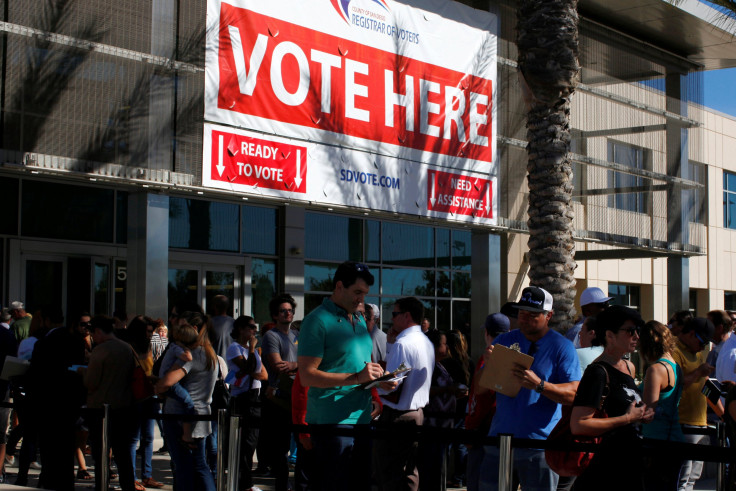Election 2016: What States Have Exit Polling? A Look At How The Results Will Be Announced On Tuesday

The News Election Pool — a group that includes The Associated Press, ABC News, CBS News, CNN, Fox News and NBC News — and Edison Research have decided to skip exit polling in 22 states where the outcome of Tuesday’s presidential election between Donald Trump and Hillary Clinton is not perceived in doubt.
Politico reported Monday exit polling will be conducted in the swing states of Colorado, Florida, Iowa, Michigan, Nevada, New Hampshire, North Carolina, Ohio, Pennsylvania, Virginia and Wisconsin, plus 16 larger states or where the race is seen as competitive. ABC is planning to list the results in 17 states on its website: Arizona, Colorado, Florida, Georgia, Iowa, Maine, Michigan, Minnesota, Nevada, New Hampshire, North Carolina, Ohio, Pennsylvania, Utah, Virginia and Wisconsin.
Also on the list, Politico said, are states where there’s a U.S. Senate race, including California, Illinois, Indiana and Missouri. Democrats need only to pick up a handful of states to seize control of the Senate.
Exit polling also will be conducted in New Jersey, New Mexico, New York, South Carolina, Texas and Washington.
Edison Research of Somerville, New Jersey, will have 933 interviewers posted at key precincts to assess the balloting. Pew Research Center reported Edison expects to interview 16,000 early or absentee voters and 85,000 voters in person.
As much as 40 percent of the vote was cast in early voting or by absentee ballot. Colorado, Oregon and Washington conduct their elections entirely by mail.
Exit polls often get a bad rap, leading members of the News Election Pool to promise results will be kept quiet until all the polls are closed. Critics say release of the results before polls close in the West tends to suppress voter turnout because voters think the election already has been decided. Jimmy Carter’s early concession in 1980 was blamed for down-ticket ballot losses.
Real-time projections are expected to be available Tuesday, beginning at 8 a.m. EST, from Votecastr.
“Much of the uncertainty in polling has to do with turnout and we're hoping to fill in the 24-hour void between the last pre-election poll analysis and the counting of the votes with data that can begin to answer the heretofore unanswerable question: Who's actually voting?” Sasha Issenberg told Politico.
The Associated Press has partnered with the National Opinion Research Center at the University of Chicago to determine the feasibility for using GPS to administer election surveys after voters leave their polling places. The results of the experiment, however, will not be released Tuesday.
© Copyright IBTimes 2025. All rights reserved.






















